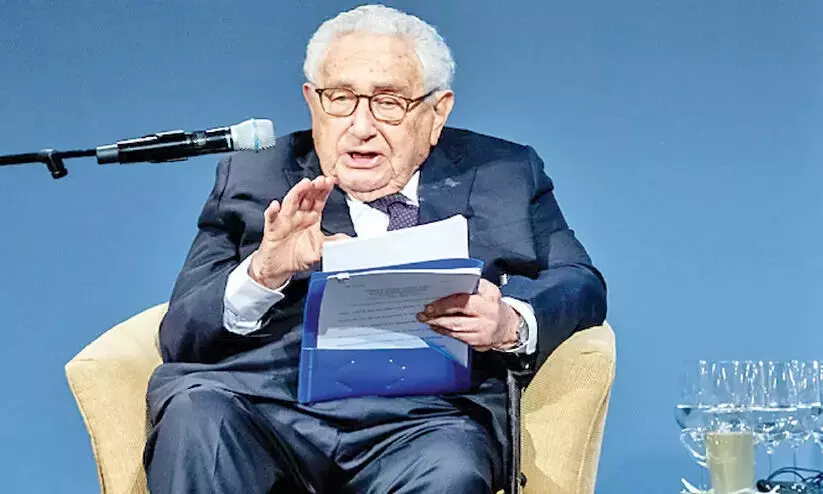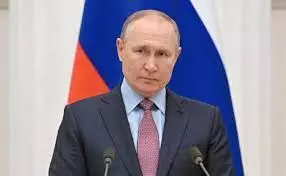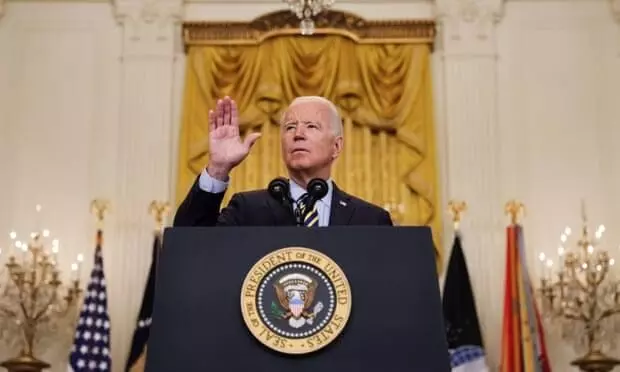
Let not Kissinger's prediction come true
text_fieldsHenry Alfred Kissinger played a key role in shaping the foreign policy of America. From 1969 to 1976, under Presidents Richard Nixon and Jerald Ford, he was Secretary of State and Advisor to the National Security Council. After the Arab-Israeli war of 1973, he was responsible for the resumption of diplomatic relations between Egypt and the United States, severed since the 1967 Arab-Israeli war.
After his retirement in 1977, he became an international consultant, writer, political analyst and an orator. Still, in his 99th year, he's looked upon as a great veteran politician and diplomat who stated in a recent interview with 'Sunday Times ' that he expected major events in China and the Middle East, without giving specifics.
Political observers all over the world are deeply concerned about the hints given by Henry Kissinger. If Kissinger expected major events in China and the Middle East, without specifying them, the Chinese split is well known in the light of escalating US-Chinese tension over the Taiwan issue. Beijing threatens to annex Taiwan. It is important for America to stall this Chinese move for economic and strategic reasons. But, in the present political situation of close cooperation and coherence between China and Russia, it will not be an easy task for Washington. It may remain a vain hope in the mind of Biden !
Last week, while addressing graduates of the military academy, President Vladimir Putin made sure that his speech was different, and filled with messages directed to his opponents in the United States and Europe, the most prominent of which were the disclosure of modern "tested" weapons that entered service, and others that are more advanced and destructive, and their capabilities especially the giant Sarmat intercontinental ballistic missile.
It was remarkable that President Putin expressed his pride in the performance of Russian forces in Ukraine, and promised to increase military reinforcements in the coming weeks and days. He revealed two military "achievements" in this speech, perhaps deliberately in the context of the psychological war he is waging against his opponents, particularly in Washington. Announcing, for the first time, the deployment of air defence systems as its mainstay, the S-500 missile, which has no parallel in the world, he said, has a range of 6000 km, and can shoot down satellites and hypersonic weapons.
He also revealed, for the first time , that the Russian army had successfully tested the Sarmat intercontinental missile, and confirmed that it would enter military service at the end of this year, and this missile could hit its target at a distance of 6000 km, that is, the eastern coast of the United States, carrying a nuclear warhead weighing up to 10 tons.
The picture seems bleak for President Zelensky so far, at least, as the Russian military incursion is eroding the land, cities and ports in the southeast of his country, while leaders from Europe, such as Macron (France), Shultz (Germany) and Johnson (Britain) make a pilgrimage to his capital, Kyiv, aoto persuade him to stand firm, unmindful of the consequences. The sanctions introduced against Russia have failed and brought counterproductive results by strengthening the Russian economy and weakening its Western counterpart, and news from the battlefields suggest that the process of annexing the Donetsk region to the Russian Federation is going on in full swing,while the Biden administration is losing its prestige internally.
What is ambiguous in Kissinger's hints is in the part related to the Middle East. After the nuclear negotiations in Vienna reached a dead end, it is likely that Israel is anticipating a war against Iran. And a senior US official told Reuters news agency on 30th June that the chances of reviving the 2015 Iranian nuclear agreement have become bleaker after the indirect negotiations that took place between the United States and Iran in Doha, which also ended without progress. At this juncture, America may find it useful to save face before being humiliated further by the war - Russian invasion of Ukraine.
While that could be the reason while Kissinger called on Ukraine to relinquish the Donbass region, and recognize Russia's annexation of Crimea, he did not ask the Israeli occupation state to make concessions that would lead to the establishment of an independent Palestinian state. It is indisputable that Secretary of State Henry Kissinger helped draft the interim agreement that led to the signing of the Israel-Egypt Peace Treaty - 'Camp David.' It was his diplomatic expertise as "statesman of the century" that helped Israel in its expansion of settlements while it proved a strategic defeat for the Arabs. Now, political observers feel that the possibilities of war in the Middle East seem greater.
The US which considers itself the guardian of the world and the protector of human rights and democracy is, whenit comes to Israel, wont to accept whatever claims the Jewish nation makes. It insists on turning a blind eye to daily Israeli crimes against Palestinians - we do not need a magnifying glass to expose them as they are being carried out in broad daylight. In a show of full support for Israeli crimes and disregard for the repeated reports that reveal Israeli crimes and discrimination against Palestinians, the US quit the UN Human Rights Council in 2018, albeit thanks to the personal insistence of Donald Trump, after it claimed it was plagued with "chronic bias" against Israel.
Earlier this year, it fully rejoined the Council, but continues defending Israel, despite the abundance of proof of its continuous crimes against Palestinians. Because of this, the American policies have failed in the Middle East and the allies who enjoyed their protection have rebelled against Washington and sided with Russia in the Ukraine war.
And that is the reason why Biden is now humiliatingly but forcefully making trips to Riyadh to rescue Israel by the formation of a 'Sunni Arab NATO ' to confront Iran.
At this time, a more severe problem has popped up between Israel and Lebanon. The Karish gas field, which contains 1.4 trillion cubic feet of probable gas, is located within a disputed area where the Israel-Lebanon maritime border is yet to be definitively laid out. But, Israel welcomed a floating gas rig from the Greek-founded, London-based Energean company to the Karish gas field off the Mediterranean coast to explore it.
The Lebanese government called on the international community to stop the exploration efforts and President Michel Aoun's office declared, " Any action or activity in the disputed area represents a provocation and a hostile act. " Hizbullah Deputy Secretary-General Naim Qassem told Reuters that his group was ready to take action "including force" against Israeli gas operations in disputed waters once the Lebanese government adopts a clearer policy.
Col. (res.) Dr. Jacques Neriah, a Middle East analyst at the Jerusalem Center for Public Affairs and a former foreign policy adviser to Prime Minister Yitzhak Rabin, deputy head of assessment for Israeli Military Intelligence, discussed the complexity of the situation with The Media Line. Israel's propaganda devices and the military maneuvers they conduct also simulate that a war is impending in the Middle East.



























